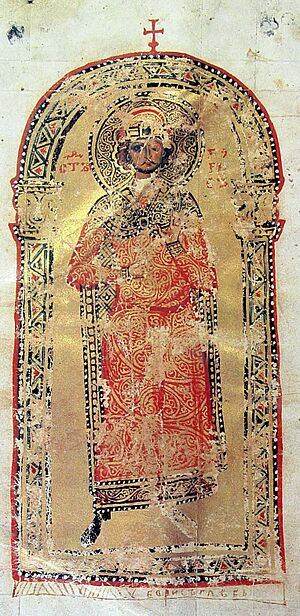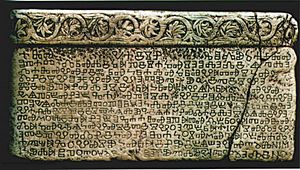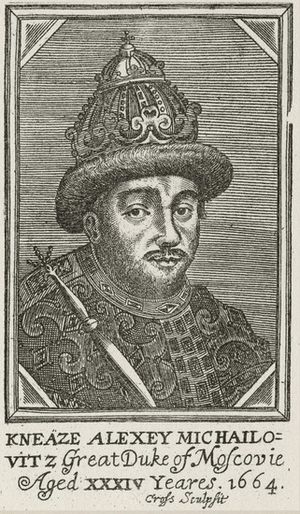Knyaz facts for kids
The word Knyaz (pronounced "knyaz") is an old Slavic title. It was used for both royal leaders and nobles in different Slavic lands throughout history. You can think of it as being similar to a "prince" or "duke" in English. The exact meaning depended on the time and place.
The word Knyaz comes from a very old Germanic word, kuningaz, which means "king." So, Knyaz is related to the English word "king."
There are also female versions of the title. In Russian and Bulgarian, it's knyaginya. In other Slavic languages like Slovene and Serbo-Croatian, it's kneginja. If a Knyaz had a daughter, she might be called knyazhna in Russian. His son might be called knyazhich.
Over time, the word Knyaz changed its meaning in some languages. In Czech, Polish, and Slovak, it can also mean "priest." In some South Slavic languages, it can mean "lord" or even just "Mister." Today, knez is still the most common way to say "prince" in Slovenian, Bosnian, Croatian, and Serbian.
Contents
What Does Knyaz Mean?
The word Knyaz comes from a very old Slavic word, kŭnędzĭ. This word is related to the English word "king" and the German word König. It was borrowed from an even older Germanic word, kuningaz. This shows how languages can share words over long periods!
Knyaz in the Middle Ages
The meaning of Knyaz changed a lot during the Middle Ages.
At first, Knyaz was simply the title for the leader of a Slavic tribe. As states began to form, it became the title for the ruler of a whole country. For example, in Kievan Rus', a large medieval state, the ruler was a Knyaz. In old Latin writings, this title was sometimes translated as "king" or "duke."
In Bulgaria, Prince Boris I changed his title to Knyaz after his country became Christian. But his son, Simeon I, took the higher title of Tsar (emperor) in 913.
As Kievan Rus' grew bigger and more organized, its main ruler became known as the Velikii Knyaz, which means "Grand Prince" or "Grand Duke." He ruled a "Grand Duchy." Smaller areas within this Grand Duchy were ruled by their own knyaz.
Even when Kievan Rus' broke into smaller pieces in the 1200s, the title Knyaz continued to be used. It was used in many East Slavic states, like Kiev, Moscow, and in the Grand Duchy of Lithuania.
Knyaz in Russia
When the Tsardom of Russia became very powerful, its Grand Prince, Ivan IV, was crowned as Tsar in 1547. This meant he was now an emperor.
Later, in the 1700s, the title Velikii Knyaz (Grand Knyaz) was used again. This time, it was given to the sons and grandsons of the Russian Emperors.
The title Knyaz also became a family title for Russian noble families. These were families who were descendants of old rulers like Rurik or Gediminas. When their lands became part of Russia, they were allowed to keep their princely titles.
Sometimes, the Tsar would grant the title of Knyaz to important people who weren't from these old noble families. For example, Peter the Great gave it to his friend Alexander Menshikov. Catherine the Great also gave it to her favorite, Grigory Potemkin.
After 1801, when Georgia became part of the Russian Empire, many local Georgian nobles were also called "kniazes." Some Tatar nobles also claimed the title because they were descended from Genghis Khan.
From 1809 to 1917, Finland was officially called the "Grand Principality of Finland" when it was part of the Russian Empire.
| Russian Word | What it meant in the past | What it meant later (after 1700s) |
|---|---|---|
| kniaz (князь) | king or duke | prince |
| kniaginia (княгиня) | queen or duchess | princess |
| kniazhich (княжич) | son of a king or duke | son of a prince |
| kniazhna (княжна) | daughter of a king or duke | daughter of a prince |
Knyaz in Poland and Lithuania
The title knyaz or kniaz also became a noble family title in the Grand Duchy of Moscow and the Grand Duchy of Lithuania. When Poland and Lithuania joined together, kniaź was an officially recognized title. It was one of the very few hereditary noble titles officially used in the Polish-Lithuanian Commonwealth.
Knyaz in South Slavic Countries
In the 1800s, the terms knez (in Serbian) and knyaz (in Bulgarian) were used again. They referred to the leaders of these countries who were becoming more independent. For example, Alexander Karađorđević in Serbia and Alexander of Battenberg in Bulgaria were called Knez or Knyaz.
In some parts of Serbia and western Bulgaria, knez was also an informal title for the oldest person or mayor of a village.
Bulgaria
- Before Alexander of Battenberg, Simeon I of Bulgaria had the title knyaz in the 9th-10th century. When he became very powerful, he took the title of tsar (emperor).
- When Bulgaria became fully independent in 1908, Knyaz Ferdinand became Tsar Ferdinand. After that, the words knyaz and knyaginya were used for the Tsar's children. For example, the person who would inherit the throne was called Knyaz Tarnovski (Prince of Turnovo).
Bosnia
In early medieval Bosnia, knez was a title used for Bosnian rulers, along with other titles like župan and duke. Stephen, Duke of Bosnia, was one of the first rulers to be recorded with this title.
Later, powerful noble families in Bosnia also held the title of knez. Sometimes, they also had an office title like "Grand Duke of Bosnia," which meant they were the supreme military commander.
Croatia
- Knez was the title for medieval rulers of parts of Croatia from the 7th to the 10th century. In Latin writings, they were often called dux (duke).
- Later, in the Late Middle Ages, knez became a hereditary title for very important Croatian noble families. These families were like "Counts" in English.
Montenegro
- Knjaz was the title used by the Petrović-Njegoš family who ruled the Principality of Montenegro from 1852 until 1905. It is translated as "Prince."
Serbia
- Knez or knjaz is a common term in Serbian history for early medieval Serbian rulers.
- It was also a noble title used by medieval rulers of different Serbian principalities.
- Under the Ottoman Empire, knez was a title for local Serbian chiefs. They were like mayors or leaders of a group of villages.
- An obor-knez was a senior chief who spoke for his district's people to the Ottoman authorities.
- Knez or knjaz was the title used by Miloš Obrenović when he became the ruler of the Principality of Serbia. Serbia became independent in 1817. Miloš's successors used this title until 1882, when Serbia became a kingdom.
See also
 In Spanish: Kniaz para niños
In Spanish: Kniaz para niños
- Voivode
- Boyar
- Hospodar
- Knyazev
- Knez (Vlach leader)
 | Frances Mary Albrier |
 | Whitney Young |
 | Muhammad Ali |




